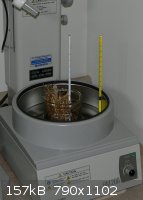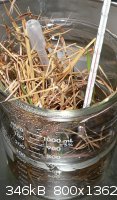kadriver
Hazard to Others
  
Posts: 196
Registered: 7-11-2012
Location: United States
Member Is Offline
Mood: Thankful
|
|
Growing Microbes in a beaker
Hello,
Back in grade school we did a cool experiment where we put dead grass clippings in a 1 liter beaker and waited for about a week or two, then viewed
the soup under a microscope and found many microoganisms.
My 7 year old nephew visits my shop and we like to do simple experiments together - he seems very interested in science and loves to hang out at his
uncle's lab.
We tried to duplicate the grade school experiement and got it all set up in my rotavap water bath. I set the temp at 35C and put the beaker experiment
in the heated water.
Is anyone familiar with this experiement? Is there some food are additives that can be added to the beaker to accelerate the growth of the microbes?
We looked at a sample on a concave silde today using a stereo microscope and found two rather healthy looking blobs swimming around in the soup.
Thanks - kadriver


|
|
|
Oscilllator
National Hazard
   
Posts: 659
Registered: 8-10-2012
Location: The aqueous layer
Member Is Offline
Mood: No Mood
|
|
although bacteria will grow just about anywhere, you might be able to accelerate their growth via a few drops of fertilizer.
|
|
|
malcolmf
Harmless

Posts: 20
Registered: 21-1-2012
Member Is Offline
Mood: No Mood
|
|
Quote: Originally posted by kadriver  |
Is anyone familiar with this experiment? Is there some food are additives that can be added to the beaker to accelerate the growth of the microbes?
|
No additives needed: just the grass clippings are all they need. It's a very old experiment, dating back to the early days of microscopy. With an
old name: Google "infusoria" for more details.
When I think of how much time I spent as a 12 year old, watching them and their busy, busy lives under the microscope.....
H.G. Wells actually did this experiment, the opening passage of War of the Worlds seems to have been inspired by it. Here's a Wells quote from
before War of the Worlds:
| Quote: |
And all the time these creatures are living their vigorous, fussy little lives; in this drop of water they are being watched by a creature of whose
presence they do not dream, who can wipe them all out of existence with a stroke of his thumb, and who is withal as finite, and sometimes as fussy and
unreasonably energetic, as themselves. He sees them, and they do not see him, because he has senses they do not possess, because he is too incredibly
vast and strange to come, save as an overwhelming catastrophe, into their lives. Even so, it may be, the dabbler himself is being curiously
observed.... The dabbler is good enough to say that the suggestion is inconceivable. I can imagine a decent amœba saying the same thing.
|
|
|
|
kadriver
Hazard to Others
  
Posts: 196
Registered: 7-11-2012
Location: United States
Member Is Offline
Mood: Thankful
|
|
Nice post, I'll google it
I agree, the quote sounds like he must have been looking through the microscope lens when he wrote it.
Thank you
kadriver
|
|
|
malcolmf
Harmless

Posts: 20
Registered: 21-1-2012
Member Is Offline
Mood: No Mood
|
|
Well, the Wells quote is from "Certain Personal matters"; a collection of magazine articles that he'd written in the early 1890s or so, http://www.gutenberg.org/ebooks/17508
"Through the Microscope" from page 159 on is about the pleasures of infusoria-watching.
[Edited on 20-2-2013 by malcolmf]
|
|
|
Dr.Bob
International Hazard
    
Posts: 2819
Registered: 26-1-2011
Location: USA - NC
Member Is Offline
Mood: Mildly disgruntled scientist
|
|
Just buy some food at a poorly run fast food joint, mix it with some water and sugar and you will have all sorts of microbes in no time. Maybe use a
salad of mixed greens, sprouts, and other veggies, some "beef" and chicken, and bread of a few types. I have cleaned out a few refrigerators before
that had a lot of leftovers left in them, and they certainly were full of microbes, some of which I was afraid would attack me. Or, if you like
eating out still, just scoop up some grass, leaves, dirt, and puddle water. I know a few people who are germaphobes who would die if they knew how
many bacteria live around, on and in them. It is thought that a significant portion of most humans weight (and DNA) is made of microbes.
[Edited on 20-2-2013 by Dr.Bob]
|
|
|
yoshiharu198
Unregistered
Posts: N/A
Registered: N/A
Member Is Offline
|
|
I Have Recently Read a book on Microbes " Microbes and Society An Introduction to Microbiology by I. Edward Alcamo " in the book special and
particular interest are the chapters devoted to microbial genetics and the controlling of microbes. The role and influence of microbes in human
affairs is given meticulous attention including the relationship of microbes to food and food safety; microbial DNA; biotechnology and industry;
microbes in agriculture and in the environment; disease and resistance; viral diseases from AIDS to Zoster; and bacterial diseases in humans.
http://www.printsasia.co.uk/book/microbes-and-society-an-int...
|
|
|
kadriver
Hazard to Others
  
Posts: 196
Registered: 7-11-2012
Location: United States
Member Is Offline
Mood: Thankful
|
|
After reading the book, what was the impression you came away with?
Some people are really obsessed with cleanliness.
If we could see the amounts (and types) of microbes that are swarming in and around us I think many would be appalled.
Its a Good thing that they are invisible to the naked eye.
kadriver
|
|
|
mr.crow
National Hazard
   
Posts: 884
Registered: 9-9-2009
Location: Canada
Member Is Offline
Mood: 0xFF
|
|
Here is an easy biology experiment I saw on TV once:
Mix regular gelatine and boiling water then pour it into a jar so its half filled with Jell-O. Swab someones sweaty feet and innoculate the gelatine.
Close the lid and wait. Don't open the lid.
Double, double toil and trouble; Fire burn, and caldron bubble
|
|
|
jamit
Hazard to Others
  
Posts: 375
Registered: 18-6-2010
Location: Midwest USA
Member Is Offline
Mood: No Mood
|
|
When I think of how much time I spent as a 12 year old, watching them and their busy, busy lives under the microscope.....
H.G. Wells actually did this experiment, the opening passage of War of the Worlds seems to have been inspired by it. Here's a Wells quote from
before War of the Worlds:
| Quote: |
And all the time these creatures are living their vigorous, fussy little lives; in this drop of water they are being watched by a creature of whose
presence they do not dream, who can wipe them all out of existence with a stroke of his thumb, and who is withal as finite, and sometimes as fussy and
unreasonably energetic, as themselves. He sees them, and they do not see him, because he has senses they do not possess, because he is too incredibly
vast and strange to come, save as an overwhelming catastrophe, into their lives. Even so, it may be, the dabbler himself is being curiously
observed.... The dabbler is good enough to say that the suggestion is inconceivable. I can imagine a decent amœba saying the same thing.
|
[/rquote]
Thank you for sharing this quote from Well! I thoroughly enjoyed reading it. I'm going to go and check out your source and read it just for the
enjoyment.

|
|
|
Rich_Insane
Hazard to Others
  
Posts: 371
Registered: 24-4-2009
Location: Portland, Oregon
Member Is Offline
Mood: alive
|
|
I used to work in a micro lab -- I can agree that interesting microbes will grow in ANYTHING, especially fungi. Every time I made plates, I'd have one
or two that had some weird colony growing on it (our Laminar hood was broken).
I know that yeast extract and broths like beef broth or chicken broth really help certain bacteria grow. Potato dextrose is good for fungi. Glucose
will help accelerate growth and some bacteria can metabolize lactose. If you take samples from soil, or some kind of pond sludge, you can get a lot of
interesting microorganisms. A couple of weeks ago, a trail flooded over. I was unlucky enough to step in the deep puddle water -- the air reeked of
methane! So there's good microbes everywhere... Though most methanogens are obligate anaerobes and would require nitrogen purging/airtight containers
to grow.
|
|
|